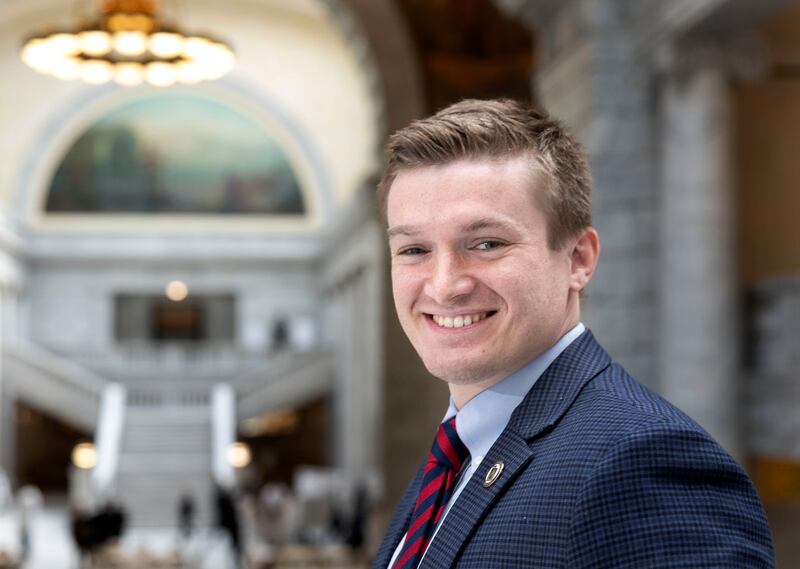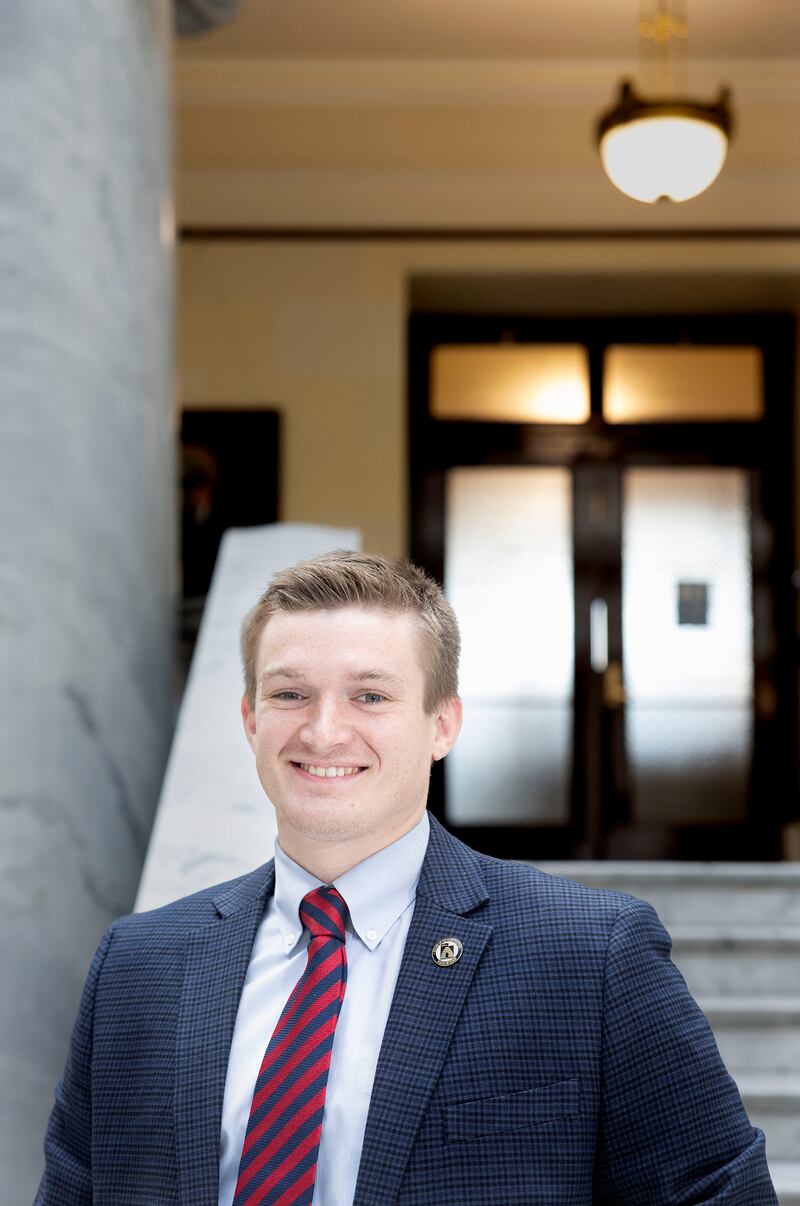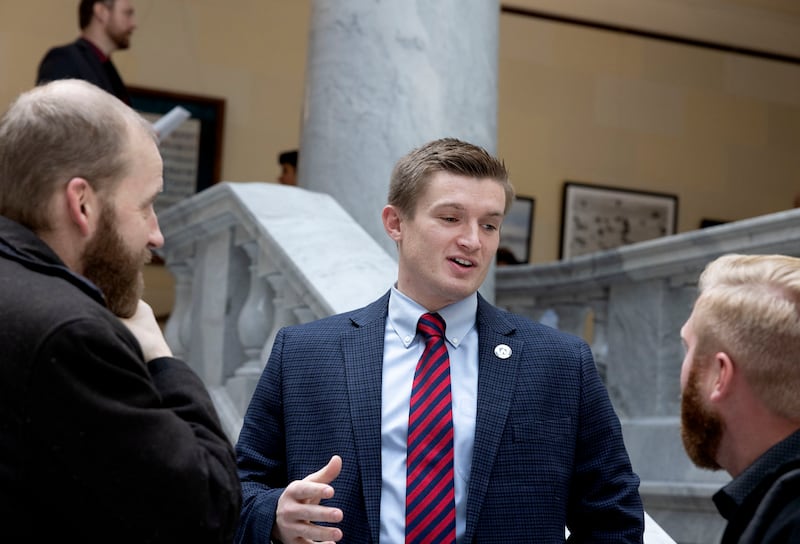Standing before a room of seasoned lawmakers one week into this year’s legislative session, Utah’s youngest legislator articulated his opposition to a bill.
“Thank you, Mr. Speaker,” he said, his words rolling with a southern inflection. “However, I believe that this bill misses the mark when it comes to our goal of strengthening public safety in Utah.”
Referring to his background in law enforcement, Rep. Tyler Clancy, a 25-year-old graduate of Brigham Young University and recently certified Provo police officer, made his case against HB27, which would reduce the penalty for some individuals found in possession of an illegal substance and a dangerous weapon, but not before referencing his “limited time here on earth,” provoking a chuckle from a few fellow representatives.
Clancy couldn’t be any younger and still hold his newly acquired office representing Legislative District 60, according to Utah state law. And while his age may have prompted a few raised eyebrows, those who know him best say they aren’t surprised.
“Tyler is a natural leader,” Rep. Val Peterson said. “He wants to serve his community and I think this is just a demonstration of that.” Peterson, who has represented portions of Utah County in the House for more than a decade, was Clancy’s church leader during his time at BYU and has helped the young lawmaker navigate the learning curve inherent in the legislative process.
According to Peterson, what Clancy lacks in years is made up for by his effort to get involved. As a member of numerous community initiatives focused on addressing problems from homelessness to sexual assault, Clancy says his firsthand perspective on how policy affects real lives, including those of young adults and children, has prepared him to represent Utah’s youngest legislative district.

A special election opportunity
Clancy was seated at his home desk the morning of Dec. 21 clearing out his inbox when he saw the announcement: Rep. Adam Robertson had resigned, leaving his North Provo seat vacant just weeks before the new legislative session was set to begin.
After a conversation with his wife, and a few calls made to mentors like Peterson, Clancy said he realized he couldn’t ignore this opportunity to help address the problems he had become so acutely aware of as a police officer and nonprofit volunteer.
“It was kind of one of those moments where you had to put your money where your mouth is,” Clancy said in a phone call with the Deseret News. “You can’t complain about it if you don’t do anything to try and make an impact.”
Once Clancy decided to enter the special election race to fill Robertson’s seat, he started knocking on doors and meeting with local GOP delegates.
“He was ready for the moment,” said Skyler Beltran, chair of the Utah County Republican Party. “I watched him at the first ‘meet the candidates’ event, and he dressed the part, he knew the part, he did the part and he made that impression right off the bat.”
A few weeks later, on Jan. 14, after delegates heard a two-minute pitch from each of the five candidates vying for the seat, a vote was taken. Clancy won decisively, receiving twice as many votes as the next contender.
A local volunteer
Clancy grew up in the coastal city of Beaufort, South Carolina, where both his parents were engaged in public service. His father, the city police chief, had risen through the ranks after coming to law enforcement from the Marine Corps. Clancy’s mother was a public school teacher.
Upon returning home from a mission for The Church of Jesus Christ of Latter-day Saints to Colorado Springs, Colorado, in 2017, Clancy enrolled at BYU studying family life, and got involved in multiple community organizations. In 2018, Clancy became a founding board member at the Utah Center for Civic Improvement, an organization that promotes increased civic engagement, and was selected to be president of the BYU College Republicans.
Around the same time, he served on a youth council for the Utah Coalition Against Sexual Assault, and later was the executive director of the Pioneer Park Coalition, a nonprofit aimed at improving support services for those struggling with homelessness in Utah.
Clancy’s reputation for community leadership was mirrored by the leadership role he earned on the BYU lacrosse team, said Matt Schneck, head coach of BYU men’s lacrosse team.
“It wasn’t just the on field capabilities that he had developed,” Schneck said. “But it was also his leadership and the way that he was able to use his personality and his humor to also create very strong relationships with his teammates to be able to help lead them both on and off the field.”
In 2018, Clancy was named an All-American collegiate player and two years later was chosen as team captain, a position that required Clancy to motivate his teammates during a 2020 season cut short by COVID-19 and to lead them to a national championship in 2021.
Clancy’s team, in turn, played a key role in helping him when his father died in the spring of 2020 after an extended battle with cancer. His father was at the front of his mind, Clancy said, as he applied for a position with the Provo Police Department where has worked since May 2022.

Bringing the ‘human element’
Being a police officer has exposed him to the real-world effects that policy has on families and individuals, Clancy said.
“I’ve seen the other side. I’ve sat with homeless folks on the curb on the south side of Provo at homeless encampments. I’ve been in homes that are shattered by domestic violence and with a future that’s totally uncertain. And I’ve met kids that are really struggling, and if the status quo stays in place, they probably won’t be qualified for some of the tech jobs that we’re bringing to the state,” Clancy said.
Clancy sees his work as a state legislator as complementary to the work he does patrolling the streets of Provo and responding to calls. So much of what police officers do, he said, is in response to problems that law enforcement can’t fix. All it can do is clean up the broken pieces, Clancy said.
But now, as one of the state’s 104 legislators, influencing which laws are created and repealed, Clancy said he plans to push for solutions, particularly in the realms of criminal justice and homelessness, that he hopes will strengthen communities and make police departments more effective.
“It’s a pretty amazing opportunity to try and make an impact full circle,” he said.
But Clancy’s inexperience on the hill, if not his age, could limit his effectiveness, according to Adam Brown, professor of political science at BYU and an expert on Utah state politics.
According to Brown, many of the challenges faced by first-time lawmakers are universal, regardless of age. “Part of it’s learning how the process works, learning the substance of policy,” Brown said. “But part of it is building these relationships, which takes time and it takes reciprocity over several years.”
And for this reason, Brown explains, “often it takes until their third, fourth session before you see legislators really hitting their stride.”
An early start
But at a January hearing, just three weeks into this year’s legislative session Clancy already seemed right at home.
The sun still hadn’t risen to thaw the 15-degree winter air when Clancy took his seat in a mostly empty committee room. Arriving well before the rest of his colleagues finished filing in, Clancy reviewed PowerPoints presented to the Executive Offices and Criminal Justice Appropriations Subcommittee with enthusiasm
“Appropriations can be death by PowerPoint,” Clancy joked, somehow seeming excited about it. And in his excitement, Clancy has spared no time getting to work.
In addition to his role as a member of the appropriations committee, he also serves on the education and judiciary committees. And Clancy has so far filed seven bills, including a bill that would provide scholarships to the children of public safety officers and firefighters who died in the line of duty; requested three more bills that were eventually abandoned; and has been a floor or co-sponsor on more than 20.
Clancy voted “yes” on what might be this year’s two most controversial bills, SB16, banning transgender surgeries for Utah minors, and HB215, which expands Utah’s education savings account program and increases public school teacher salaries.
Clancy said his biggest takeaway from his brief experience as a lawmaker is that it is a much more complicated and arduous process to construct something worthwhile than it is to tear down what’s not.
But building is what he came for, Clancy said. “I want to serve for a time, be effective and go back to spending time with my wife, playing softball and being a good cop.”



